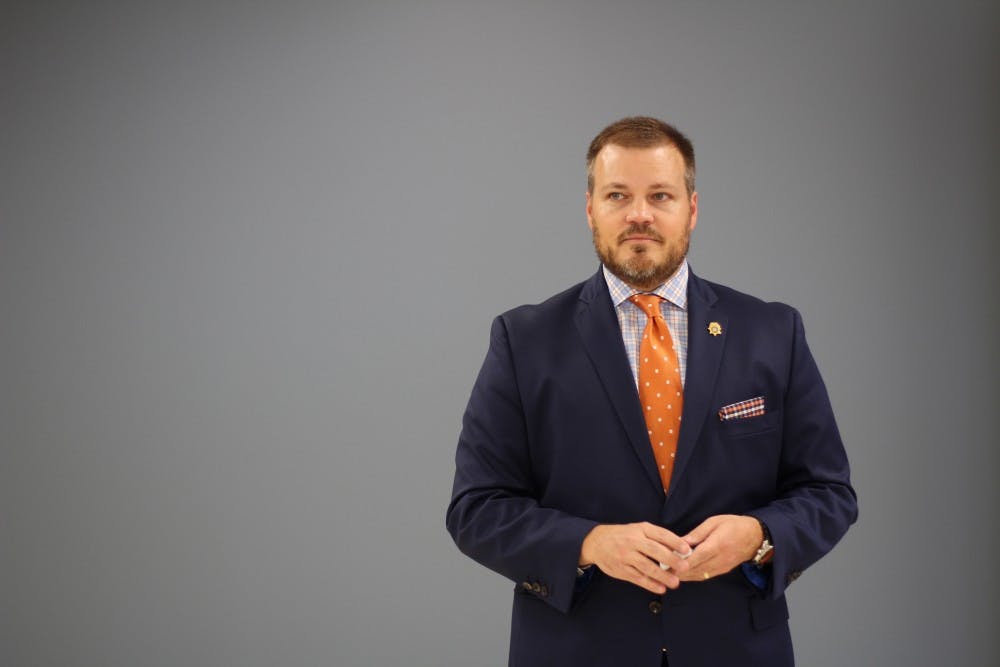The Lee County District Attorney’s office is in the Lee County Justice Center, the same building as the district court. This allows for District Attorney Brandon Hughes and his team to work with a variety of cases that pass through the courtrooms.
The DA’s office has 21 staff members, including six people dedicated to the child support unit, six prosecutors, two circuit court judges and two lawyers in each circuit court.
Hughes graduated from Auburn University in Montgomery, obtained a law degree from Jones School of Law in Montgomery and worked in the Montgomery County District Attorney’s office after passing the bar exam. He began work with the Alabama District Attorneys Association in 2007, which allowed him to move to Lee County.
“When I went to work [for the ADAA], I became [the] state’s expert in impaired driving,” Hughes said. “That crime is about the most complicated case a prosecutor can try. You’ve got the most complicated cases being tried by the most green prosecutors.”
Hughes was brought into the ADAA as a traffic safety resource prosecutor. He became the state’s resource on impaired driving, assisting in cases and training police and judges around the state.
“I interacted with a lot of different people that were a lot smarter than me for nine years, and I got this knowledge base,” Hughes said. “I loved being a prosecutor. That’s not what I set out to do when I went to law school, but I fell in love with it immediately.”
Hughes worked in various DA offices around the state and learned that many people were unhappy with the Lee County DA’s office at the time. He decided to take a gamble and leave his federally funded position to run for Lee County District Attorney. He began campaigning in 2014 for the 2016 election.
“[I left] a job I loved. And I had a family, so I took a chance leaving that job to run,” Hughes said. “I grew frustrated a lot talking to other DAs and seeing how their offices are run — I felt like I could do it better.”
Hughes saw the chance to run as an opportunity to further his career beyond being a prosecutor. He took office in January 2017.
“When I got here, the office was not well-run,” Hughes said. “There was no clear vision; it was very fractured.”
Hughes set forth an agenda of putting crime victims and law enforcement first by allowing them to give input in cases. The DA has authority to decide to his or her best judgement whether a crime occurred and whether there is enough evidence to try the case. If both criteria are met, he or she submits the case to the grand jury and can also offer a plea deal within the bounds of the law, though sentencing is in the hands of the judge.
Older cases, or those for which a suspect is waiting in jail, are prioritized for a grand jury, Hughes said.
Hughes keeps himself informed with cases passing through his office by presenting them to the grand jury. He keeps up with his staff to make sure he knows how cases are running, and he said he stays most heavily involved with the most important cases.
Hughes does not carry a caseload of his own, but he tries all capital murder cases and major cases in the public eye. He usually tries four to five cases per year.
“I think it’s important to be a visible part of the community,” Hughes said. “Not a lot of people know what a district attorney does. ... When I ran, I realized no one knew who the current DA was.”
People who walk into the DA’s office will be met by Hughes, either immediately or at a later appointment. He meets with both victims and defendants about a broad variety of issues.
“I think it’s important for this office and law enforcement, especially in this day and age, to be seen, not just when things are bad but ... during the good times,” Hughes said. “[People shouldn’t] see the police, the DA’s office or law enforcement in general as, ‘If we see them around, it means something bad is happening.’”
Drug take-back kiosks were installed in 2018 at four pharmacies in the county. Hughes said he uses programs like this to make a positive impact on the community.
He also created the Pre-Trial Diversion Program, which allows for nonviolent criminals without a prior record to complete a program in 12–18 months to dismiss their case and avoid a permanent record.
“Being in this position gets so many opportunities to impact people,” Hughes said. “There are the bad guys, the crime victims, their families.”
The cases Hughes sees are typically high profile, and dealing with them can be pressured and delicate.
“There is an immense amount of pressure when you’ve got a homicide and a family that wants justice, or you’ve got a rape victim that says, ‘No one believes me, but you believe me,’” Hughes said.
Hughes recalled various times when he’s been stopped in public and thanked for what he does. It’s an otherwise thankless job, Hughes said; with social media, it’s easier for citizens to criticize public offices without seeing the big picture or the laws that guided their decisions.
Hughes recounted the work he put into the Lori Ann Slesinski case and how high emotions can run in this line of work.
“[Lori Ann Slesinski] graduated from Auburn back in 2006,” Hughes said. “She goes missing on a Saturday and is reported [missing] on a Tuesday. Auburn PD investigates the crime and it goes unsolved. They believe they know who did it, but no arrests were made.”
In 2017, at an investigators’ meeting, Hughes came in contact with some people from a newly started investigative unit asking to continue the investigation from the decade prior. Despite not having found the dead body, Hughes agreed to continue with the investigation.
“In August 2018, we indicted Darrill Richard Ennis for killing Lori Ann Slesinski as capital murder, and we’re seeking the death penalty,” he said. “Making that phone call to Lori’s mother — for 12 years, she’s had no answer, but to be able to make that phone call and say, ‘We’ve got the guy. He’s in custody, and dadgummit we’re gonna get him,’ — that’s about as good of a feeling I’ve had in this office.”
Hughes remembers being stricken with emotion.
“I remember standing in that press conference with Lori’s family announcing we had made an indictment,” Hughes said. “It was very emotional; I was trying to announce what we’re talking about just because so much work goes into it. [We tried] the case and poured everything into it for months that results in an arrest and a conviction. Those are incredibly emotional moments for me.”
Hughes plans to run for office again in 2022. He believes he can make the most impact in Lee County as district attorney. He plans to remain district attorney for as long as the residents of the county will keep him there.
“The DA needs to be an active role,” Hughes said. “For so long, it’s been a passive role, and you were just the crime fighter. I think that’s changing; we need to see what we can do to make an impact beforehand. We’d rather not have to prosecute these folks if there’s something we can do on the front end to help that.”
Hughes can often be seen on the scene of homicides alongside police officers and investigators. During the investigation of the kidnapping and murder of 19-year-old Aniah Blanchard, he said he was working with law enforcement every day. He missed Thanksgiving with his family to be alongside the men and women working on a crime scene that day.
Hughes expects that same amount of effort to be put forth by the officers and investigators who work with him.
“I ask a lot of law enforcement, but I hope they ask a lot from me,” Hughes said. “If I’m willing to ask it, I’m going to be out there with them, shoulder-to-shoulder, side-by-side.”
Hughes said he believes his time in office has been successful.
“I think law enforcement relations in this office [have] never been better,” Hughes said.
Do you like this story? The Plainsman doesn't accept money from tuition or student fees, and we don't charge a subscription fee. But you can donate to support The Plainsman.





